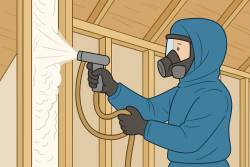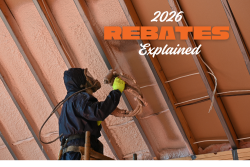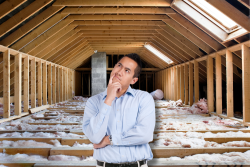A shining new car or a splendid home often speaks of Canadian aspirations. Whether these possessions represent success or debt, their care remains paramount, just like a car finds refuge in a garage, attached or otherwise.
But let's delve deeper. Garages, iconic to Canadian households, aren't merely shelters for cars. They represent more – a haven from the hustle, a workshop, a storage hub, or just a space to breathe. However, their efficiency is often at the mercy of the weather. Surprised? An uninsulated garage can indeed mimic outdoor temperatures, limiting its use seasonally. The respected Mike Holmes emphasized in a National Post column,"A properly insulated garage is not just a luxury but a safety necessity."
Making the Most of Your Garage Space
Safety & Sealing: With an attached garage, ensuring harmful fumes or exhaust don't creep into your home is paramount. The magic word? Insulation.
Air Returns & Insulation: A modern construction practice sometimes involves using the garage’s wall cavity as a return air duct. However, caution is crucial. You don’t want your home breathing in garage air, filled with exhaust and other particles. Further, an insulation gap can invite more than just chills - it compromises fire safety. It's wise to install a fire-rated door, roughly an inch thick, between the garage and home.
Overhead Rooms: Got a room perched above your garage? Without insulation, it’s like living in a fridge. Enter spray foam insulation. This solution offers a robust thermal barrier, and its closed-cell design further protects against harmful gases from entering your living spaces.
To Heat or Not To Heat: If you have a heated garage, insulation is a no-brainer. Without heat? Think twice before insulating, as it might lead to mildew. However, if your garage doubles up as a routine workshop or is in line for a makeover into a cozy room, warming it up with insulation is the way to go.
Raw Frames & Sealing: If your garage flaunts raw framing, slip in insulation between the studs and top it up with drywall. Ensuring no gaps around windows and outlets keeps the drafts at bay. After all, ensuring comfort in the garage hinges largely on controlling its temperature.
Insulate with the Best: Reitzel Insulation
Wondering about insulation for your garage? Seek the expertise of Reitzel Insulation, hailing from Kitchener-Waterloo. Dial 226-241-9991 for insights, backed by a five-year workmanship warranty and unmatched project clean-up standards. Proudly serving Hamilton, Mississauga, Kitchener-Waterloo, Guelph, Brantford, Oakville, and Burlington.


















